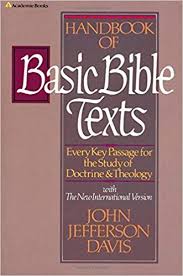Thursday Theology from John Jefferson Davis
We can all benefit from succinct, well-stated insights from people who have thought through theological ideas. I like to draw attention to these nuggets of wisdom on my Facebook and Twitter feeds in my weekly #ThursdayTheology segment. Today, we’ll consider several quotes from theologian John Jefferson Davis.

Dr. Davis is a veteran evangelical Protestant theologian and author. He is a professor of systematic theology and Christian ethics at Gordon-Conwell Theological Seminary, where he has taught for more than 40 years. He has written several books in the areas of Christian theology, doctrine, ethics, and science. His book Handbook of Basic Bible Texts is one of the most helpful works I’ve used in my research and study of Scripture and theology. When I write and speak on biblical and theological topics I always refer to Davis’s book.
Here are four quotes from Davis and some thoughts on them.
1. God’s Love for Sinners
“God takes the initiative in love, loving those who can claim no merit or favor in and of themselves. The eros of the Greek tradition responds to attractive features in the beloved; the agape of the God of the Bible is love for the unlovely.” 1
It is amazingly encouraging to know that as a sinner I have nothing to attract God; nonetheless, he loves me. While God doesn’t need me, he wants me. Our salvation in Christ is unmerited, unearned, and undeserved. From first to last, it is a gift of grace from an infinitely loving God.
2. On the Life of the Mind
“This great impetus to intellectual advance came from the conviction that the Bible was indeed a written revelation of divine origin and authority. Christianity, a ‘religion of the book,’ fostered literacy and education on the most comprehensive scale.”2
To be made in the image of God makes people intellectually endowed. As followers of the Logos (Jesus the Word, John 1:1), Christians engage in a knowledge tradition of learning. Reading and study are necessary to understand the propositional revelation from God. Christians are a bookish people who can and should seek the life of the mind to the glory of God.
3. On the Incomprehensible Mysteries
“While human logic can assist in preserving revealed mysteries such as the Trinity and the incarnation from heretical distortion, human logic in and of itself can never fully comprehend them. Human logic points to the mysteries, and guards them, but can never claim to fully possess or control them.”3
The mysteries of Christian religion (Trinity, incarnation, atonement, etc.) cannot be fully fathomed by the finite mind of human beings. Yet these truths do no damage to reason itself and the principles of reasoning even help to articulate, define, and defend these Christian verities.
4. On the Two Books
“The results of modern science, properly understood, are no threat to Christian faith. Christian faith and scientific method are understood to be complementary ways of knowing God’s creative work, each having its distinctive ways of knowing, methods and areas of validity.”4
The book of nature (God’s world) and Scripture (God’s Word) are compatible and harmonious because they both come from the hand of the Creator. Interpretation of the books may conflict but not when the books’ explanations of truth are understood and properly applied.
John Jefferson Davis’s writings are insightful for the study of Christian theology, philosophy, and science. His diligence has provided plenty of doctrinal reflection to enrich our understanding of our loving Creator.
Reflections: Your Turn
Are there Christian theologians that you’ve learned from? Who are they? Visit Reflections on WordPress to comment with your response.
Resources
See my introduction to Davis’s book in “Take Up and Read: Handbook of Basic Bible Texts”
Check out more from Reasons to Believe @Reasons.org
Endnotes
- John Jefferson Davis, Handbook of Basic Bible Texts: Every Key Passage for the Study of Doctrine and Theology (Grand Rapids: Zondervan, 1984), 30.
- John Jefferson Davis, Foundations of Evangelical Theology (Grand Rapids: Baker, 1984), 215.
- John Jefferson Davis, Theology Primer (Grand Rapids: Baker, 1981), sv. “Logic,” 29.
- John Jefferson Davis, The Frontiers of Science and Faith (Downers Grove, IL: InterVarsity, 2002), 7.





